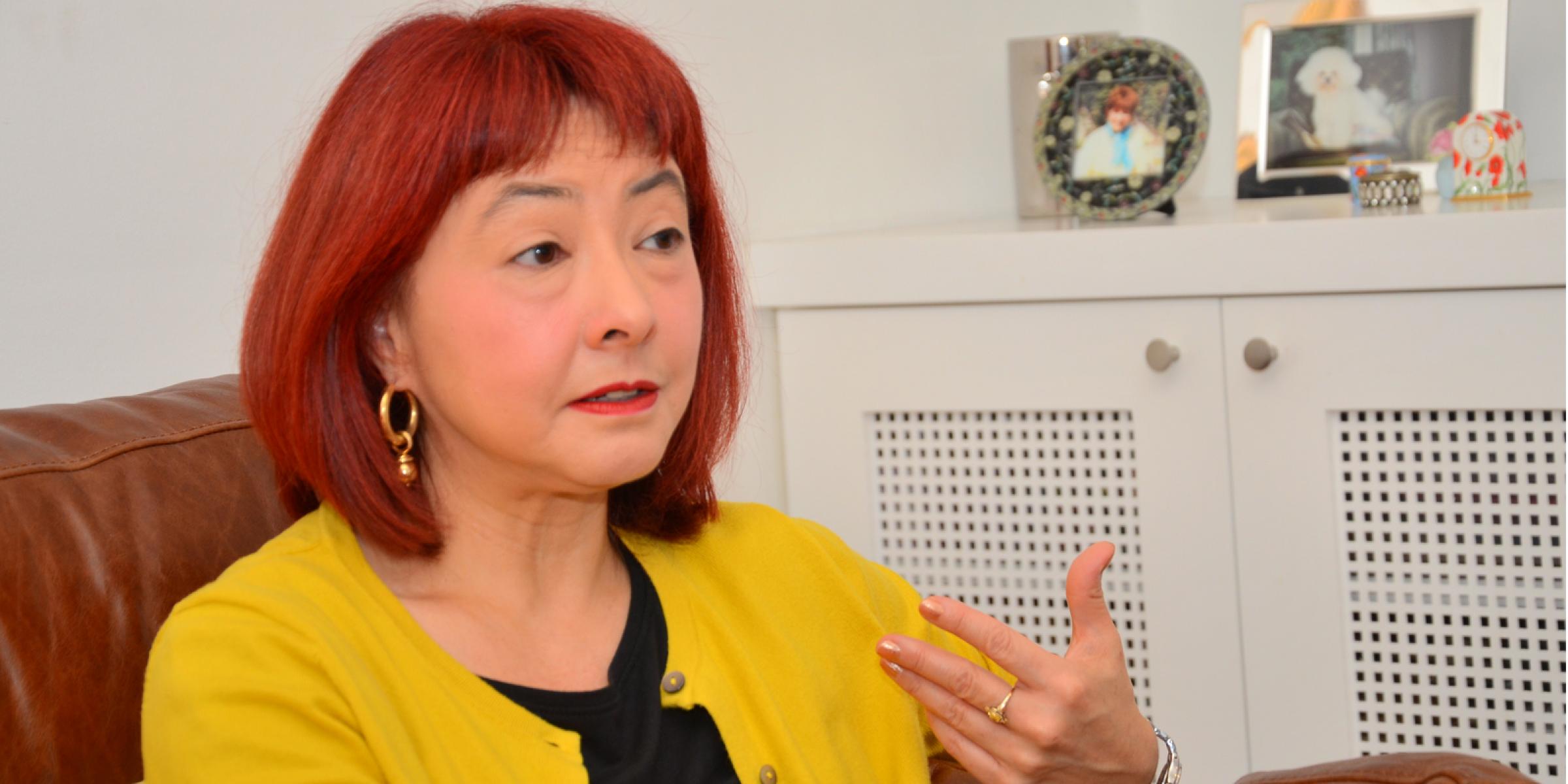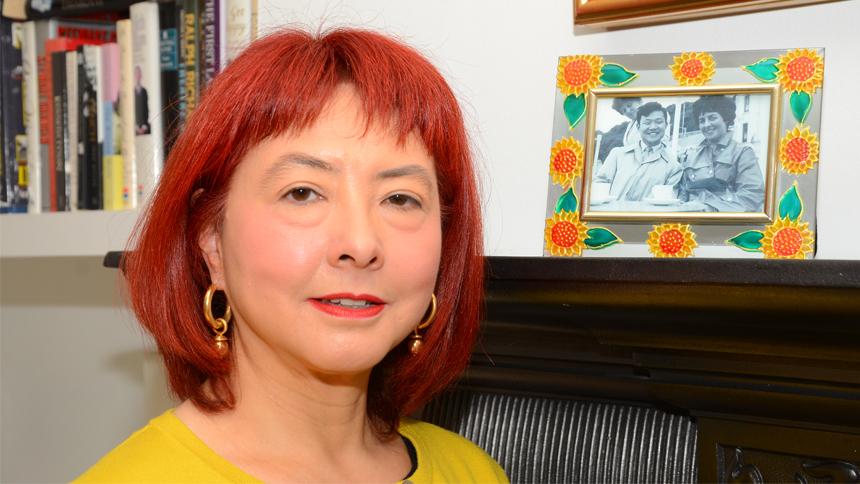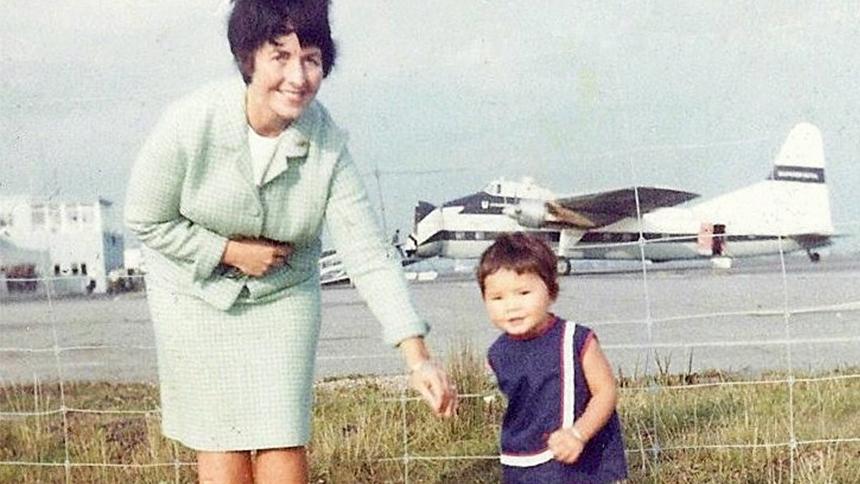
Somewhere inside: A carer hopes her words still make an impression
Ming Ho is determined to retain whatever connection she can with her mother, whose dementia is advancing.
I understand intellectually why Mum is the way she is, but it’s totally different to accept it emotionally,’ says Ming Ho, whose mother Glenys has dementia.
Glenys, 92, was diagnosed with mixed dementia – Alzheimer’s and vascular dementia – in 2011. Her condition has totally changed their mother–daughter relationship, leaving Ming to wonder how she can tap back into what they once had.
Warm and friendly
Glenys was born in Chorley, Lancashire to parents from north Wales and always considered herself Welsh. She was a professional classical singer who performed at concert halls, cathedrals and on BBC radio broadcasts. After getting married she became a school teacher, though continued to train others in singing.
‘She was always very warm, generous and friendly,’ says Ming. ‘She was very empathetic – almost too much. She would be the first to help someone in trouble. She was also a bit of a joker and had a great sense of humour.’
Ming, originally from Gloucestershire but now living in north London, was the only child of Glenys and her husband, Wai Kwong Ho, a nuclear physicist from Shanghai in China. Wai Kwong died in the late 1980s, when Ming was still a student.

Ming says it's been hard to accept the massive change in her mum’s personality
Extreme reactions
Ming has seen her mum’s behaviour and personality change drastically over the years. She thinks there were very early signs after Glenys lost her husband, retired and saw her daughter move away from home, all in quick succession.
‘She started having extreme emotional reactions to things,’ says Ming. ‘She became unnaturally possessive of me on occasion and felt threatened by my relationships with others.’
A neighbour died around 10 years ago, but Glenys didn’t show or seem to feel the kind of sympathy that could be expected.
‘She was strangely angry, defensive and resentful,’ says Ming. ‘The family put a note through her door to let her know the news, but she somehow saw it as an imposition. She said, “They can look after themselves!”’
Glenys would have moments of paranoia or delusion, becoming uncharacteristically antagonistic.
‘It came and went in flashpoints, so was very hard for any of us to grasp,’ says Ming.
She acknowledges how difficult it must have been for friends, especially as Glenys was yet to be diagnosed. However, Ming was still surprised and saddened that some chose to cut ties with her mother.
‘I can understand people being confused, but some we had known for 30 or 40 years were quite mercenary, even when I explained things,’ she says.
Crisis point
As things worsened, Ming’s attempts to call in support for both Glenys and herself were hampered by her mother, who didn’t think anything was wrong.
‘She wasn’t eating or washing, and was getting into distress, but could present as normal when visited by professionals,’ says Ming. ‘She told a social worker, “What do I need a carer for?”
‘That had been my opportunity to get some help but she totally rejected it. I was dying inside.
‘I used to say she was in denial, but now I see that she was unable to recognise her condition.’
With Glenys’s needs coming first, Ming’s career went on hold. Having been a TV script editor, she had gone freelance as scriptwriter in 2000, writing for programmes such as EastEnders and Casualty.
‘I used to say Mum was in denial, but now I see that she was unable to recognise her condition,’ says Ming.
‘I never intentionally gave up work, but when Mum reached crisis point I had to stop pitching and fell out of circulation,’ she says.
‘Thankfully I am now back in business, but for years there was so much going on with Mum, I didn’t have the time or headspace. Every day there was a crisis.’

Ming struggles with the feeling of losing her close connection with her mum.
Agonising decision
Glenys entered a care home in Gloucestershire in September 2011 and initially seemed to settle in well.
‘It was a big upheaval so I was hugely relieved that she accepted the home and was able to thrive there,’ says Ming.
But in 2015 the manager left and the feeling of the home quickly changed.
‘There was evidently an imperative to cut costs and maximise profit,’ says Ming. ‘The staffing ratio in Mum’s unit was cut by half and the continuity went.
‘Mum was admitted into hospital with aspiration pneumonia in the midst of this trauma. The situation was very upsetting.’
After much agonising, Ming decided to move Glenys in May 2018.
‘I struggled with it, as I worried that a move could kill her. But she’s settled well and seems as content as she can be anywhere,’ she says.
Ming makes the 200-mile round trip to visit Glenys almost every week, never fully knowing what to expect.
‘That’s been one of the hardest things to accept – the massive change in Mum’s personality,’ she says.
‘She can still have cheeky moments and is relatively articulate but she’s also much more withdrawn and suspicious.’
Supporting and informing carers
We have a range of publications about caring for a person with dementia.
Support and hope
Having learned more about dementia from fellow carers and professionals on Twitter and Alzheimer’s Society’s online community, Talking Point, Ming has blogged about her own experiences at www.dementiajustaintsexy. blogspot.com
However, she still struggles with the feeling of losing her close connection with her mum.
‘I know not to expect her to react as a mother to me – if it happens it’s a bonus,’ she says. ‘But she sometimes talks to me as if I’m staff or a waitress, which I find tragic as we have a lifetime’s history.
‘Sometimes she’ll say nasty things. I try and rationalise it but it still hurts. I still have a cry over it.’
Some of these themes and feelings are explored in ‘The things we never said’, the award-winning BBC Radio 4 play that Ming wrote about the relationship between a mother who has dementia and her daughter.
‘It wasn’t until Mum went into care that I stepped back and started thinking about the story I wanted to tell,’ says Ming.
‘Somewhere inside I hope she has an instinct of someone who loves her and cares about her,’ says Ming.
‘Mum’s been everything to me and I’ve been everything to her. I was the centre of her world. We’re each other’s only close family. But now she doesn’t know who I am. The play was grappling with that. What is a relationship? How can that disappear? How can you tap back into it?’
Although she knows that their relationship can never return to what it was, Ming is determined to retain any essence of what she and Glenys once had.
‘Every time I leave I say, “Remember I’m always thinking about you.” I know she won’t remember but I hope it makes an emotional impression,’ she says.
‘Somewhere inside I hope she has an instinct of someone who loves her and cares about her. I don’t want that to be broken.’


Ron Rhodes
saysThe magazine article from Ming Ho about her relationship with her Mum has brought back vivid memories of looking after my elderly uncle in Bristol.I started to care for him full time in July 2014.He was diagnosed with Vascular Dementia in December 2014.His mental condition got steadily worse until he finally passed away on 23 May 2018 aged 91.My uncle sometimes said things to me that upset me, but I knew that was not my Uncle Ron speaking,rather it was the effects of the Dementia illness that he had that was making him talk like that.I never dwelt on his negative comments to me.Instead I always used to cast my mind back to when he was fit and healthy,very outgoing,with a great sense of humour.Having never married,he loved foreign travel to Spain,Greece and a passion of cruising.Being single, he found very easy to make friends quickly.It was very distressing for me to see my uncle gradually change due to the ravages of his mental illness.My Uncle Ron never asked to get Dementia.Like other Dementia sufferers it was, and is, a cruel blow that life has dealt on them I consoled myself to the fact that it was the course of nature taking over,; with Vascular Dementia,old age and frailty taking it's toll.As such ,however much I worried about him, there was nothing that I,or medical staff, or dementia medication, could do to stop the disease advancing.Dementia of any kind is a terrible illness and has such a devastating impact on both your loved one, and yourself as a carer to them I would not wish Dementia on my worse enemy.It is a terrible illness ,with such devastating effects ,on both the sufferer and their families.My late Mum,Ruby,was brother to my late Uncle Ron.They were both born and raised in Bristol.My Mum always said to me to just do the best you can in what ever situation you find yourself in during your life.You cannot do miracles.Each night ,after putting Ron to bed, I turned in for the night to my bed ,In bed, I always reflected on what my Mum had said to me many times in the past.'Just to do you're best .If you have done your best then you cannot do anymore' So before I went to sleep,I put my hand on my heart and said that today I had done my best for my uncle.That is all that one can do for your're loved one.You are not a machine ,you are a human being,coping as best you can with what life throws at you.I never, ever, look back with regrets ,about what I might or might not have done differently looking after Uncle Ron, or anything else in the past, in my life, for that matter. We all have regrets,that is life I'm afraid ,and however much we worry about the past,we cannot change a thing .There is no use beating yourself up about it, and making yourself ill ,with regrets about how you would do something or say something differently if only you had the chance. I will close now.To conclude, I was happy with what I did for Uncle Ron, when I cared for him ,at is home ,in Bristol.But I could not have done it without the help and support from my sister and three brothers who were living 200 miles away from me in Doncaster .Likewise ,I could not have done it without the love,care,devotion and compassion afforded to me and my late uncle from carers;social workers at Bristol City Council;all the staff at Bristol Royal Infirmary; all the staff at Saffron Gardens Care Home,at Whitehall ,in Bristol;all staff at the Bristol office of the Alzheimer's Society;all the staff at Bristol,Callington Road, Psychiatric Hospital.Whenever I needed help, I only I had to ask and people were there.There were absolutely superb.I could not have done what I did for my uncle, without these outstanding people.Please take my advice ,if you have the care of a loved one, who is suffering the ravages of Dementia illness.Never,ever, bottle things up, and try and cope with it all on your own.You cannot and you never will ,believe me .You are not a machine,you are a human being,with feelings,frailties and emotions all of your own.Never hesitate to ask for help from wonderful, caring people, the likes of which I met whilst looking after my uncle.I am sorry this has been a mini version of 'War and Peace'! I just wanted to try and help other carers of loved ones with Dementia ,of my own personal experiences ,of what I went through looking after my late Uncle Ron.I wish you peace and comfort, both to carers and to your loved ones ,who are suffering from Dementia.
Ming Ho
saysHi, Ron -
Thanks very much for taking the trouble to share your own story and kind thoughts.
I’m sorry to hear you’ve had a similarly traumatic experience and appreciate your advice. In the interview there wasn’t room to explain the situation fully, but as mum’s journey with dementia has been a long one, I have been through several stages of acceptance and do understand that, when she is antagonistic, it is the disease, not her. Fortunately, she is not always like this with me, she can also be benign or good-humoured on a good day, with still a cheeky sense of humour on occasion, more like her original sweet self, but it’s unpredictable, as you will know. I know she would never be unkind to me if she knew who I was (and any antagonism comes from a place of fear in not understanding her own surroundings), but that’s what I was trying to explain in the discussion - however much you understand these things intellectually, emotion is another matter; you can never wholly rationalise grief at the loss of your past relationship.
Although it was initially very hard to get over the hurdle of moving mum into care, I can say I don't feel guilty about that any more, because I do know I have done my best for her and will continue to do so always. (I have written about that decision and its practical and emotional challenges in a two-part post on my blog: http://dementiajustaintsexy.blogspot.com/2015/08/my-biggest-lie-part-1… & http://dementiajustaintsexy.blogspot.com/2015/08/my-biggest-lie-part-2….)
Since mum went into care, I have found solace in getting involved with research and campaigning for organisations such as the Alzheimer’s Society, Dementia UK, and a specialist charity, Dementia Carers Count, which offers support courses specifically for family dementia carers (I’m a member of their Carers Advisory Panel, helping to develop the course content and plan a national resource centre, set to open in the Midlands in 2020.)
I have also had some counselling along the way and agree that it helps to be able to talk things through with a neutral person. I wish this were more widely available to everyone.
Thanks again for taking the time to respond to this piece. I hope you now have some time for yourself too, and wish you a happy Christmas.
All the best,
Ming